Trade and Security Trump Democracy in Burma – Part II
Trade and Security Trump Democracy in Burma – Part II
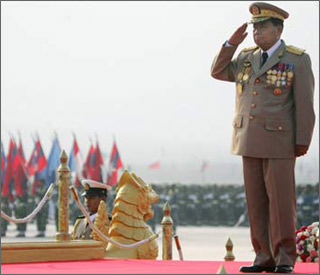
powerful neighbors who care more about their own interest than suffering people
LONDON: The world is appalled by images and accounts of brutality in Burmese cities and looks for ways to pressure the military regime. But one point is clear: The standard tools of Western liberals and NGOs are not likely to be effective in our multipolar world and in Burma specifically. In the 1970s and 1980s, activists shamed Western companies doing business in apartheid-era South Africa by boycotting products or calling for divestment. Corporations doing business in Burma are beyond the reach of the activists. So activists should target the governments backing the junta rather than the companies active in Burma.
For some time now, activists have targeted two oil companies, Total of France and Unocal, a Chevron subsidiary, because they have major investments in Burma.
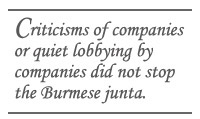
Representing a group of Burmese civilians who preferred anonymity for safety reasons, the Washington-based International Labor Rights Forum sued Unocal in the United States under the Alien Tort Claims Act, which allows any litigant, even a non-American, to sue a multinational company for a tort that violates the law of nations or any US treaty, even if that act was committed outside the US. Unocal, accused of using forced labor in Burma, did not admit wrongdoing, but settled the case out of court.
Total, too, was sued in a French court, and settled the matter with litigants about two years ago. The firm initiated a socioeconomic development program in areas near the Yadana pipeline and, to assuage critics, invited Bernard Kouchner, now France's foreign minister and among the founders of Médecins Sans Frontièrs, to visit the site. His report was largely positive.
Premier Oil, a British oil company, too, had faced pressure, not only from campaigners, but also from then British foreign secretary, the late Robin Cook, who asked the company to leave Burma. The firm sold its interests to Asian companies some years ago.
But criticisms of companies or quiet lobbying by companies did not stop the Burmese junta. As the situation in Burma deteriorates, activists in France and elsewhere plan protests at Total's facilities, and Belgian prosecutors decided to reopen a case against Total for crimes against humanity.
Whether economic sanctions can change the behavior of a regime like Burma's is a complex issue, and the extent to which the regime in Rangoon can survive because of contributions foreign firms make through taxes and other payments is unknown, given the opaque nature of the country and its finances, including other sources of revenue, not all of them legal.
The underlying assumption behind campaigns and lawsuits is that Western firms have leverage to influence intransigent regimes. That assumption ignores how globalization has reshaped our world.
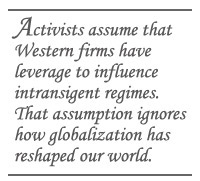
The biggest investors in Burma are companies from China, Thailand, Singapore, and India, as a Human Rights Watch press release notes. As globalization shifts centers of production, logistics and marketing from traditional centers to new locations, the decision-makers also change. A Western company is susceptible to pressure because it operates in a competitive marketplace and must respond to a range of stakeholders. Part of a free society, the company must deal with activists chaining themselves to its facilities, seeking newspaper photographs and expecting no worse punishment than warnings from local police. Firms from China and Singapore don't face such scrutiny; firms from Thailand and India, while investing abroad, have not yet aroused the attention of local activists about their activities overseas.
This allows Chinese firms, often state-owned entities, to act exactly the way their owners want. Such investments prop up unrepresentative regimes. Last year, a senior executive of the European Investment Bank in Luxembourg lamented that its standards on environmental and social issues were so high that it regularly loses business to Chinese lenders, often in the least-developed countries. Western firms and governments are powerless in this regard.
Burma's leaders know this. They can live with Heineken or Carlsberg leaving Burma, because they know Asian breweries will take over those projects, as indeed they did in the mid-1990s.
Many Western activists haven’t grasped this concept, that substitutes are readily available in a globalized world, although Western governments have factored it in, and lean on China to influence Burma. At first glance, asking China to do something seems bizarre: In 1989, China used the People's Liberation Army against its own non-violent students. Why would China care about monks in Burma?
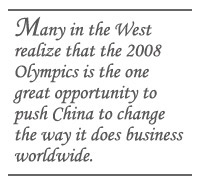
The answer may lie in the 2008 Beijing Olympics. Many in the West realize that China's coming-out party is the one great opportunity to push China to change the way it does business worldwide, particularly if it wants to be taken seriously as a world power. Hence, the pressure on China over the conduct of Sudanese-supported militia in Darfur, and now Burma, two states regarded as China's responsibility. The world expects China to rein in these governments.
Activists predictably focus on US companies like Coca Cola and Western artists, like Steven Spielberg, to influence China. Spielberg has said he may quit his position as artistic director for the Olympic Games over Darfur. Chinese leaders resent foreign lectures about how they should manage their internal affairs, and it’s debatable if such campaigns can bring substantial change in China.
One of the outcomes of multipolar globalization – in which China, India, Singapore, Thailand, Brazil and Russia have become important players – is reduced leverage for the West. The business interests that benefit from Burma are no longer in London, Paris or New York and more likely to be in Kolkata, Beijing or Singapore – beyond the reach of the activists.
Holding a candlelight vigil in front of the Burmese embassy in any city of the world is symbolic and necessary, so that ordinary citizens can express revulsion. Such protests publicly humiliate Burma's diplomats in the cities where they like to shop and be seen as part of the smart set. Picketing in front of gas stations is another story: The fuel at the gas station may actually have come from Nigeria or Texas, even if the gas station’s logo is that of a French company doing business in Burma. That company may not be the most important investor in Burma. Increasingly, in fragile states, countries like China call the shots. Unencumbered by local pressures, they can invest anywhere, irrespective of risks to reputation.
The rise of China raises opportunities, threats as well as challenges. It is vital that China becomes a responsible superpower. But how China views the world is not the way the world has worked in the past.
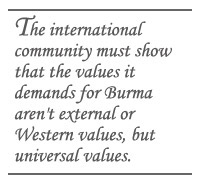
China wants to reshape the debate, and its handling of Burma shows that. It has spoken of the principle of non-interference in the internal affairs of a country, to prevent the UN Security Council from taking aggressive action on Burma. The challenge for the international community is to show that the values they want to see reflected in the behavior of Burmese authorities aren't external or Western values, but universal values. Globalization ensures some shared virtues: Bringing about lower prices is one shared value, and freedom of expression and opposition to corruption and violence are others.
And one area where global values trump localist exceptionalism is the Universal Declaration of Human Rights, approaching its 60th anniversary, and which all nations of the world, Burma and China included, say they respect.
Salil Tripathi is a London-based writer who specializes in Asian and international economic affairs. He is former correspondent for India Today and Far Eastern Economic Review.